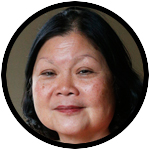
Carolyn Woo
In June, I had the privilege of working with beloved colleague Leo Burke to organize and facilitate a dialogue at the Vatican among CEOs of the world’s leading oil and gas companies and investment firms. Hosted by the Dicastery for Promoting Integral Human Development and funded by the Mendoza College of Business at the University of Notre Dame, the event included a session with Pope Francis.
Leo had been deeply concerned that, with devastating consequences, we will not be able to hold down emissions to keep global warming below 2 degrees Celsius in accordance with the Paris climate agreement. Without downplaying individual responsibility, we wanted to reach out to key business sectors that could accelerate global progress.
As oil and gas companies explore for, refine, produce and distribute fossil fuels, they are understandably our first selection. Investment firms, through their stock ownership in these companies, are exposed to climate-related risks that can significantly diminish the value and earnings of these firms, and ultimately the well-being of their clients.
[hotblock]
Our goal was not to gather these firms for finger-pointing, lecturing or laying down a mandate of our wishes. We saw such a tone as presumptuous, naive and counterproductive. Our aim, instead, was for transformation or hearing with the heart. It drew from the Holy Father’s call in “Laudato Si'” to engage, dialogue and collaborate.
Leo and I feel strongly from personal experience that the most critical conversations require respect, willingness to consider the best of each other, trust that allows for the expression of concerns and vulnerabilities, and something that compels us to hope.
As parents, we both understand that you cannot scold a child into excellence. We are aware that CEOs operate under rigorous expectations for financial performance that often dictate priorities. Resolving the climate crisis would require new priorities and a different set of responsibilities.
In essence, our hope was for the participants to come as CEOs of their respective companies and to leave as elders of the human family.
The language of social justice reminds us that climate is not only an economic and technological issue; it has a moral dimension. While true, I think this framing is insufficient.
As we relate to our children, grandchildren and family in general, we think not in terms of our moral obligations to them, but act instinctively out of love and the desire for their best, to protect them against the worst, and to pass on what we cherish most.
We hope to recover our sense of family from this dialogue. We know we are emboldened by friendship, solidarity, affirmation and collaboration.
Admittedly, this goal is unlike any professional convening we have ever undertaken. From the very beginning, we counted on the Holy Spirit. Leo prayed each day over each name on the attendee list as it was coming together.
When I was about to panic about not having more time to keep reading and preparing, I reminded myself that if this is not God’s work, it will not succeed. If this is God’s work, God will give me the words.
From the moment of greeting to the hugs at farewell, through spirited exchange and awkward moments, as we listened to the Holy Father and crafted our responses back to him, we hung together. We recognized the enormity of what we are facing and we converged on certain priorities.
I know the Holy Spirit was working the room. I do not know what will happen after this, but trust that the Holy Spirit accompanies our participants and will keep knocking on their hearts.
***
Woo is distinguished president’s fellow for global development at Purdue University and served as the CEO and president of Catholic Relief Services from 2012 to 2016.
PREVIOUS: When Catholics gather to share and listen, good things happen
NEXT: ‘Civic disruption’ requires moral, pastoral response



Share this story